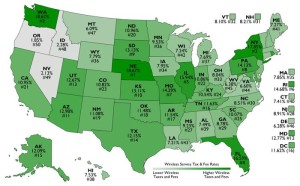All levels of government in the United States, including even school districts, like to gouge the taxpayer to cover budget shortfalls, initiatives that are not fully funded and new projects to supposedly benefit the average person, but many may be surprised that they are applying a high tax rate to a person’s cellphone bill for that additional revenue.
The Tax Foundation published a report last week that noted federal, state and local governments, school districts and 911 systems are applying taxes and surcharges to mobile phone bills that could end up costing customers an additional 17.2 percent, up from 16.3 percent more than a year ago, on their monthly bill.
In a difficult economy, double-digit tax rates can be quite troubling for an average American, but what might irk some people is that a lot of these taxes are hidden on the monthly wireless bill and usually ignored. The tax rates do vary from state to state, though, and a customer in New York could pay up to 12 different taxes, while a Nebraska resident may have to pay $74.69 on a $60 bill – Oregon has the nation’s lowest wireless tax rate.
What could a bill look like? The invoice could consist of a state excise tax, local utility gross receipts tax, franchise tax, school district utility sales tax, universal service tax, state wireless 911 and many more. Each American pays nearly six percent to the Universal Service Fund in order to pay for rural phone services.
Opponents of the wireless tax tell CNN that politicians tend to utilize mobile phones to raise taxes in order to avoid upheaval among the electorate when it comes to other taxes, such as income or sales.
“Wireless taxes have long been a fairly frictionless way for states and cities to get revenue,” said Jot Carpenter, vice president of government affairs at telecom industry association CTIA, in an interview with the news outlet. “It used to be a tax on the wealthy, but now that most people have cell phones, it’s hard to say it’s just targeting the rich now.”
There isn’t any respite in sight for cellphone users, but legislators are attempting to pass bills that would temporary cease any hikes in wireless tax rates. “What needs to happen is an overhaul of this poorly thought-out tax policy. But before you can fix it, you have to stop digging the hole,” added Carpenter.
Even if the taxes are still hiked, Americans won’t do anything about it because they are addicted to their phones. A recent study found that the average American spends roughly an hour each day staring at their smartphone – nearly half the time is spent texting and talking, while the other time is utilized sending emails, playing games, social networking and others.
This is also costing Americans a lot of money every year. The Wall Street Journal reported that the average household is spending more than $1,200 annually on their telephone services, up from $1,100 in 2007 – families are also already paying more for their smartphones than cable television and home Internet. (In a Gawker comment section, one reader admitted to forking over as much as $400 a month on smartphones.)

Leave a Comment